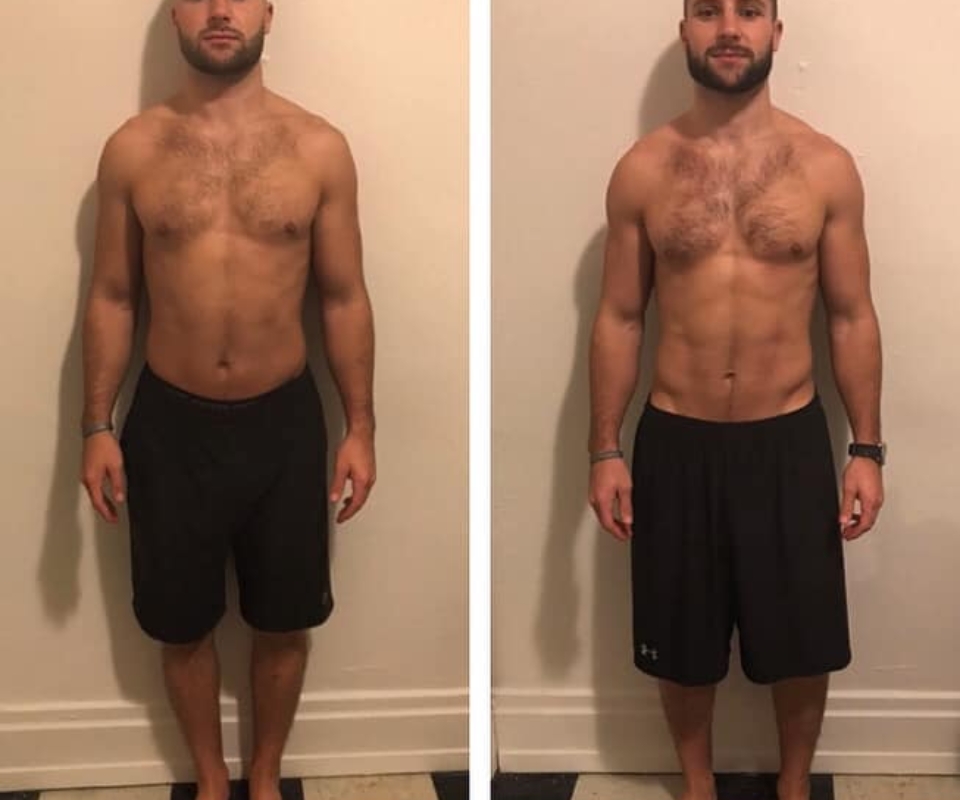By definition, you can’t “hold yourself accountable,” and even attempting to is a massive waste of time—because being held accountable means you’re “…required or expected to justify actions or decisions.”
And how are you supposed to require justification from yourself? By catching yourself in the pantry at 2AM and asking yourself why you’re sabotaging your goals?
Logically, it doesn’t work.
You need external sources of accountability to do well, and you’re about to learn the six best sources (for transformation goals)—starting with a favorite of mine:
Source #1: Quantitative
Technically, this is the closest you can get to “holding yourself accountable,” as you can track your own:
• Calorie intake
• Protein minimums
• Bodyweight averages
• Measurements
• Workout performances
But speaking from experience, very few people follow through when they don’t like the numbers they see. For example, staying off MyFitnessPal when they overeat, or avoiding the scale the day after they overeat.
So it’s in our best interest to have someone else tracking our numbers—which paint a real, tangible picture of how we’re doing—on a regular basis (like I do for my clients).
Source #2: Social
I’ve seen this work wonders in my group coaching programs. When you’re part of a tight-knit community with like-minded people, you’re more likely to show up and “do the work.” Nobody wants to be “dead weight,” or perceived as flaky.
Other examples include:
✓ Joining a semi-private workout model, like a CrossFit, group exercise studio, or running club. Other members will push you to be consistent.
✓ Starting a group chat with friends, family members, or co-workers with similar goals. I once coached a group of nurses who knew each other, and they did this with massive success—regularly sharing wins, obstacles, and motivation with each other.
✓ Getting co-workers involved with a “health initiative” based on healthy habits, like hydrating well, getting up for steps, and more.
Source #3: Deadline-based
In general, I’m not a huge fan of deadlines (especially self-imposed ones), as they often lead to less-than-sustainable habits, and high stress slip-ups—but non-negotiable deadlines are extremely powerful.
Take a bride-to-be, for example. There’s no WAY they’re messing around as their wedding creeps up, as there’s minimal room for error if they want to hit their goals before their big day.

Other examples include:
• Vacations
• Reunions
• Photoshoots
• Road races
• Athletic events*
*Like obstacle races, powerlifting meets, or triathlons.
Again, the most important caveat here is that your deadline is non-negotiable. Otherwise, you’ll subconsciously take your foot off the proverbial gas.
Source #4: Financial accountability
Most people are highly responsive to financial accountability, as we all want to maximize dollars spent. This said, the dollar amount that “drives us” is different for everybody.
In some cases, a $10 per month Planet Fitness membership is an adequate investment to encourage consistency. In most cases, however, the amount you’re investing needs to make you mildly uncomfortable.
And so you know I take my own medicine: I’ve invested $1,500+ per month in fitness, business, and writing coaching. At this price point, you better believe I was motivated to follow through.

Personal finance expert Ramit Sethi says you can tell a person’s priorities by their bank statements and their calendar
Other worthwhile investments include:
• Online coaching
• Personal training
• Meal prep services
• An event with a registration fee
• A photoshoot deposit
• Reverse bets*
*If you’re unfamiliar, a “reverse bet” is where you have a trusted friend or family member handle some of your cash until you follow through with a goal. If you don’t follow through, they’ll send it somewhere you don’t like. For example: my buddy Mike Vacanti asked his friend to donate $1,000 of his money to the IRS if he didn’t meet a work deadline.
A lack of financial accountability is why most “low-end” solutions (like $67 eBooks, free trials, and membership-based apps) don’t keep you consistent. There’s not enough skin in the gym to get you to care.
Source #5: Public accountability
This is similar to social accountability, but doesn’t exist within the confines of a community. This is where you make your goals known to people who take interest (of any level) in your process.
I utilize this source, often, when tackling personal challenges, by sharing my goals with my social media following, and documenting my process. Although nobody’s technically doing it with me, knowing people are watching is enough of a driver to get me to follow through.
Another example of public accountability is sharing your goals with co-workers. If you make it known you’re training for a marathon, and they’re regularly checking in, you’re more likely to follow through with your process.
My sister experienced this firsthand when she told my family she was running her first marathon a few years ago. With how often we checked in, she would’ve felt embarrassed* if she backed out.
*This is NOT to say we would’ve “twisted the knife.” But we all want to be known as people of our word.
Source #6: Personal accountability
Finally, we have the single most effective accountability source: personal accountability—where you’re “required or expected to justify actions or decisions” to someone who’s trying to help you succeed. In other words, the exact definition of being held accountable.
By far, the best way to ensure this source is by investing in a professional whose full-time job is keeping you to your word—as friends and family (understandably) aren’t going to be overly invested in your success.
Speaking from experience, nobody wants to tell someone who’s helping them that they didn’t do something because they “didn’t feel like it,” or “weren’t feeling motivated.” No, that’s not a good feeling—so you WILL follow through.
Take my clients, for example:
I ask them about everything I see in MyFitnessPal. I ask them to schedule their workouts AND I check to see if they completed them. I analyze their progress and speak up if their effort isn’t in line with their goals. I routinely reach out to offer help even if they’re “ghosting.”
Knowing this, they operate differently than they would if they were answering to themselves—which, again, is illogical and unproductive.
Couple with with the fact that they experience:
✓ Quantitative accountability, when they’re tracking everything I ask of them, and challenging the numbers.
✓ Deadline-based accountability, as the program lasts 6+ months (to weed out “quick fixers”).
✓ Financial accountability, in that they’re investing just enough to get them to take consistent action.
✓ Public accountability, if they choose to share their goals (and investment) with those close to them.
You’ve got a recipe for massive success, as these clients can attest to:
Also, you must keep in mind: our responsiveness to each accountability source fluctuates over time.
The CrossFit community that once motivated you might not be as effective as personal coaching after a few months. The $47 per month gym membership may not move the needle for you after the “new gym feeling” wears off. The workout PR’s that once excited you may feel mundane.
That’s why you need as many accountability sources in place as possible, to account for fluctuations in responsiveness, and push you when you’re “not feeling motivated” to continue.
So let me know if you’d like to answer to me, directly. I’ll never give up on you or let you “off the hook” from your commitments to yourself:















